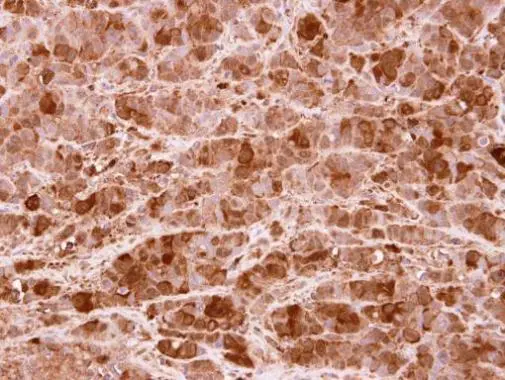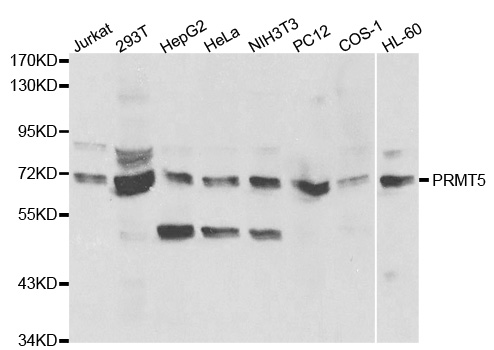
WB analysis of Jurkat lysate using GTX88383 PRMT5 antibody, Internal. Dilution : 2μg/ml Loading : 35μg protein in RIPA buffer
PRMT5 antibody, Internal
GTX88383
ApplicationsWestern Blot
Product group Antibodies
ReactivityHuman
TargetPRMT5
Overview
- SupplierGeneTex
- Product NamePRMT5 antibody, Internal
- Delivery Days Customer9
- Application Supplier NoteWB: 1-3microg/ml. *Optimal dilutions/concentrations should be determined by the researcher.Not tested in other applications.
- ApplicationsWestern Blot
- CertificationResearch Use Only
- ClonalityPolyclonal
- Concentration0.50 mg/ml
- ConjugateUnconjugated
- Gene ID10419
- Target namePRMT5
- Target descriptionprotein arginine methyltransferase 5
- Target synonymsHRMT1L5, HSL7, IBP72, JBP1, SKB1, SKB1Hs, protein arginine N-methyltransferase 5, 72 kDa ICln-binding protein, HMT1 hnRNP methyltransferase-like 5, SKB1 homolog, histone-arginine N-methyltransferase PRMT5, jak-binding protein 1, shk1 kinase-binding protein 1 homolog
- HostGoat
- IsotypeIgG
- Protein IDO14744
- Protein NameProtein arginine N-methyltransferase 5
- Scientific DescriptionThis gene encodes an enzyme that belongs to the methyltransferase family. The encoded protein catalyzes the transfer of methyl groups to the amino acid arginine, in target proteins that include histones, transcriptional elongation factors and the tumor suppressor p53. This gene plays a role in several cellular processes, including transcriptional regulation, and the assembly of small nuclear ribonucleoproteins. A pseudogene of this gene has been defined on chromosome 4. Alternative splicing results in multiple transcript variants encoding different isoforms. [provided by RefSeq, Sep 2015]
- ReactivityHuman
- Storage Instruction-20°C or -80°C,2°C to 8°C
- UNSPSC12352203



![PRMT5 antibody [N3C3] detects PRMT5 protein at nucleus by immunofluorescent analysis. Sample: A431 cells were fixed in 4% paraformaldehyde at RT for 15 min. Green: PRMT5 stained by PRMT5 antibody [N3C3] (GTX115409) diluted at 1:500. Red: alpha Tubulin, a cytoskeleton marker, stained by alpha Tubulin antibody [GT114] (GTX628802) diluted at 1:1000.](https://www.genetex.com/upload/website/prouct_img/normal/GTX115409/GTX115409_44384_20220916_ICC_IF_22102723_400.webp)
![PRMT5 antibody [N1N3] detects PRMT5 protein at cytosol on mouse intestine by immunohistochemical analysis. Sample: Paraffin-embedded mouse intestine. PRMT5 antibody [N1N3] (GTX115994) dilution: 1:500.
Antigen Retrieval: Trilogy? (EDTA based, pH 8.0) buffer, 15min](https://www.genetex.com/upload/website/prouct_img/normal/GTX115994/GTX115994_40212_IHC_M_2_w_23060519_630.webp)

![Various whole cell extracts (30 μg) were separated by 7.5% SDS-PAGE, and the membrane was blotted with PRMT5 antibody [GT3610] (GTX628488) diluted at 1:1000. The HRP-conjugated anti-mouse IgG antibody (GTX213111-01) was used to detect the primary antibody, and the signal was developed with Trident ECL plus-Enhanced.](https://www.genetex.com/upload/website/prouct_img/normal/GTX628488/GTX628488_41148_20221104_WB_22110919_895.webp)

